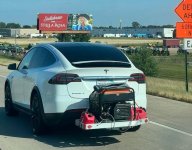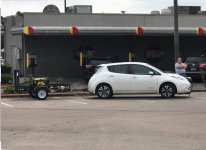His electric vehicle battery died. One year later, he's still waiting for a replacement
Supply chain issues, changing technology make it harder to find batteries for older EV models
Ryan Patrick Jones - CBC NewsSome car owners looking to replace the battery that powers their Nissan Leaf electric vehicles are frustrated with how long it's taking to get back on the road.
Mississauga, Ont., resident Atif Harooni bought a new Leaf in 2017 to save money on gas and to take advantage of a $14,000 government rebate for electric vehicles.
"It was good and it all ran well," Harooni told CBC Toronto in an interview. "I really like driving it and it's very little maintenance."
But much of his goodwill has since drained.
Harooni was told the vehicle's main high-voltage battery needed to be replaced after the car broke down on the highway twice last year: first in late November, then again one week later. He had to hire a tow truck to haul it to his local dealership in Milton, Ont., both times.
While the replacement falls under the warranty covering 160,000 km or eight years, whichever comes first, Harooni said he is still waiting for it to arrive — and he has no idea when that might
He said at first he was told by staff at the Milton dealership that a replacement battery was in stock and would be ready in a week. Then, he was told he would have to wait three months.
One year later, Harooni's still driving a courtesy rental car and paying out of pocket for gas while his Nissan Leaf sits in the parking lot of the dealership. He said he's moved up from 17th to 15th in the nationwide queue for replacement batteries, but still doesn't have an estimated date for when he might get one.
In a recent email to Harooni viewed by CBC Toronto, a representative of Nissan Canada said the automaker is experiencing "global supply chain shortages," causing delays in the production and delivery of electric vehicle batteries in Canada.
"Initially, I was OK with it. I understood there might be supply chain issues. But not giving me the ETA is just frustrating," Harooni said. "They are producing new car batteries right now, so I'm not sure why they can't produce replacement batteries."
Quebec Leaf owner unsure when battery replacement will happen
Harooni is not the only Nissan Leaf driver waiting indefinitely for a replacement battery.
Chris Hornibrook, who lives near Sherbrooke, Que., said he bought a used 2016 Nissan Leaf four years ago. When the battery failed this October, the dealership told him it would need to be replaced.





